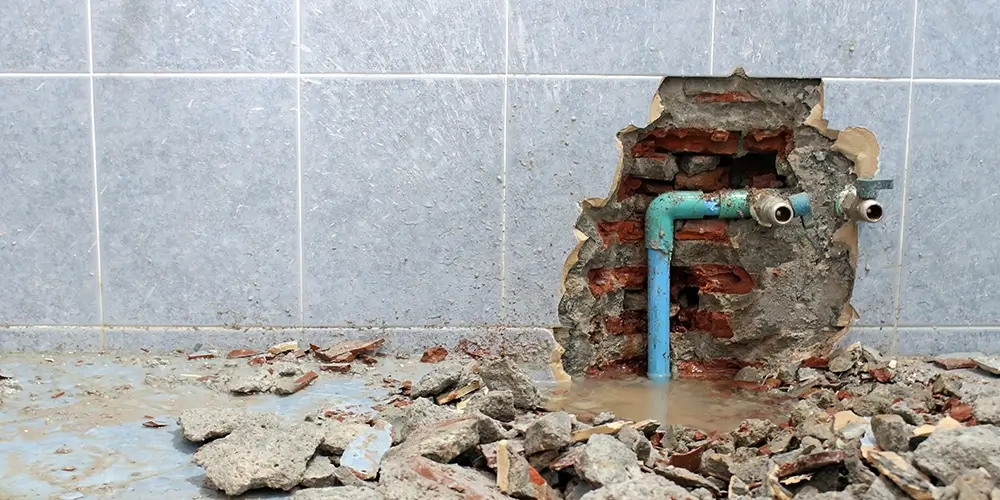You just opened your water bill. It’s ten times higher than expected! It looks like a mortgage payment. What gives?
You watered the grass less, took shorter showers, and flushed fewer times last month. Why are they charging you ten times more?
So now you review your options.
- You can call the water department to complain.
- You can call the water department to lament and hope someone takes pity on you.
- You can fall to your knees, give thanks for having averted a disaster, and call the plumber.
#3 is the correct course of action. Allow us to explain.
High Water Bills Can Be a Warning Sign
A high water bill happens for a reason — carelessness with water use, extravagance, or maybe it points to a plumbing problem.
The problem could be minor, like a constantly running toilet you never got around to fixing, or it could be serious, like a slab leak.
Slab leaks often go undetected until a pipe bursts and floods your home, resulting in a costly repair that makes your water bill look like a tip for the barista at Starbucks.
So if your water bill just put you on high alert for a slab leak in your home, you should be thankful, not angry.
But several plumbing problems can raise your bill significantly. Let’s review the lineup of usual suspects.
1. A Toilet That Won’t Stop Running
Toilets account for nearly 27% percent of the water consumption in the average American household. And that’s when they’re working as designed — a running toilet can waste up to 200 gallons per day.
That’s 1669 lbs of water or 0.83 US tons. Per day.
You should be able to hear a toilet running or see water movement in the toilet bowl.
Now peek inside the tank.
- Check the flapper. Do you need to replace it?
- Check the float valve. Should you adjust or replace it?
- Check the chain attached to the flapper. Is it too short?
If nothing else, you can reach behind the toilet and turn off the water supply until you have time for a repair.
2. Leaky Faucets & Other Fixtures
Faucet leaks are easy to spot. They’re not always easy to repair, and sometimes the only option is to replace the entire fixture.
If you’re handy, you may be able to replace worn O-rings, washers, cartridges, and gaskets. If you’re not, call the plumber — a leaky faucet can waste up to 3,000 gallons of water per year.
Other fixtures, like shower heads and bathtub faucets, may develop leaks with age. And a leaking or faulty pressure regulator could be wasting water.
3. Hoses & Sprinklers
Check hoses and sprinklers for leaks.
You should also check your outdoor faucets for drips, which can add up over time — and don’t forget to check irrigation systems, too.
Inspecting your sprinkler system regularly can help you detect problems before they become serious and cause a sharp increase in your water bill.
4. Leaky or Burst Pipes
Pipe leaks tend to start small, as pinhole leaks. They’re often undetectable until a pipe bursts, the inevitable outcome when it continues to corrode.
If a pipe bursts, pray that it happens in the yard, not in your home’s foundation. A foundation leak is a “slab leak” — the worst of all leaks because it destroys your home’s foundation and structure, creates flooding, and promotes mold growth behind walls.
Smart inline water sensors can detect a slab leak and shut down your water system; otherwise, the first clue of a problem may be a high water bill.
Other signs of a slab leak include:
- Wet spots on the floor
- Warped flooring
- Cracks in the foundation
- Warped baseboards and walls
- Moldy smells
Call a plumber immediately if you suspect a slab leak in your home.
Leaky Pipes Can Destroy Your Home’s Foundation
Most homes have water pipes in or under their concrete foundation. All pipes deteriorate with age, and when they do, they leak.
A plumber can reline old pipes or replace them with trenchless methods. But a badly corroded pipe will do tremendous damage, even if it’s seeping water and not flooding. It will break down the concrete of your foundation and undermine your home.
Your foundation is already in a delicate situation. Because it touches the soil, it’s always in contact with moisture. A leaky pipe can stress your foundation to the point where it will no longer support your home.
Water harms foundations in three ways.
a. Hydrostatic Pressure
Water from a leak saturates the soil around your foundation, placing additional pressure on it. This pressure can crack the foundation and make basement walls bow inward.
b. Unstable Soil
Soil becomes unstable as it absorbs moisture and turns into mud. Anything sitting on it can slip and shift. This movement causes structural problems for your house.
c. Eroded Soil
A burst pipe can release water with enough pressure to erode the soil around and underneath your home’s foundation. The concrete slab will settle unevenly and further into the ground, causing structural damage to your home.
FAQs: Reasons for High Water Bills
Q: How can I check if my toilet is leaking?
You can perform a simple dye test by adding food coloring to the water in your toilet tank. If the color appears in the bowl without flushing, you have a leak.
Q: Can a slab leak be repaired?
Yes, but it’s crucial to address it as soon as possible to prevent further damage to your home’s foundation and structure.
Q: How do I know if my pipes are leaking under my foundation?
Wet spots on the floor, warped flooring, cracks in the foundation, and musty odors are signs of a slab leak.
Q: What causes a pipe to burst?
Pipes can burst due to factors like freezing temperatures, corrosion, or high water pressure. Regular maintenance and inspections can help prevent this.
Q: Can a high water bill indicate a hidden leak?
Yes, an unexpectedly high water bill is often one of the first signs of a hidden leak, such as a slab leak or a pipe leak behind walls or underground.
Q: What tools can I use to check for leaks at home?
You can use a water meter to monitor usage and detect anomalies. Smart water sensors and leak detection devices can also help identify leaks early, especially in hard-to-access areas like your foundation or behind walls.
Q: Should I adjust my water pressure if I suspect leaks?
High water pressure can contribute to leaks and damage over time. To prevent strain on your plumbing system, test your water pressure with a gauge and adjust it to the recommended range (typically 40-60 psi).


